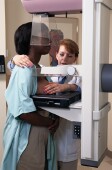- Could Your Grocery Store Meat Be Causing Recurring UTIs?
- Are You Making This Expensive Thermostat Error This Winter?
- Recognizing the Signs of Hypothyroidism
- 10 Strategies to Overcome Insomnia
- Could Artificial Sweeteners Be Aging the Brain Faster?
- Techniques for Soothing Your Nervous System
- Does the Water in Your House Smell Funny? Here’s Why
- Can a Daily Dose of Apple Cider Vinegar Actually Aid Weight Loss?
- 6 Health Beverages That Can Actually Spike Your Blood Sugar
- Treatment Options for Social Anxiety Disorder
Black Women More Likely to Have Dense Breast Tissue, Study Shows


New research finds that black women are more likely than white women to have dense breasts, potentially boosting their breast cancer risk.
“Since breast density is associated with breast cancer risk, a better understanding of racial differences in breast density levels could help us identify women at the highest risk for breast cancer and target prevention strategies to those women,” study author Anne Marie McCarthy, said in a news release from the American Association for Cancer Research. McCarthy is a research fellow at Massachusetts General Hospital in Boston.
In terms of both volume and area, black women had denser breasts than white women, even after researchers adjusted their statistics so they wouldn’t be thrown off by factors such as high or low numbers of women of certain ages or weights.
Denser breasts make it harder to detect breast cancer via mammogram, and they’re thought to boost the risk for the disease. For this study, researchers said they used a better technique to measure breast density than that traditionally used by radiologists.
The study included almost 1,600 black women and more than 1,250 white women who were screened using mammography from 2010 to 2011 at the University of Pennsylvania.
“Our findings are using a new, quantitative and, perhaps, more reliable way to measure breast density,” McCarthy explained. “Our next step will be to see how quantitative density measures and other imaging biomarkers are associated with cancer risk, cancer subtype and stage of diagnosis by race.”
The study was to be presented Monday at the American Association for Cancer Research annual meeting in Philadelphia. Research released at conferences should be considered preliminary until published in a peer-reviewed medical journal.
More information
For more about breast cancer in black women, visit the U.S. Department of Health and Human Services.
Source: HealthDay
Copyright © 2026 HealthDay. All rights reserved.










